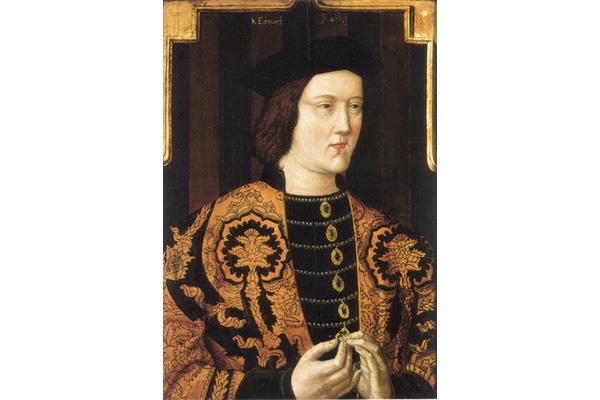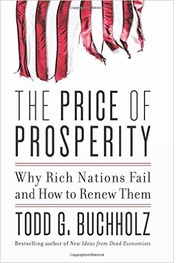Mr. Trump: Meet the Thinking Man’s Strongman

There are few more famous lines on history (or meteorology) than Richard III musing on “the winter of our discontent” -- those sunny days brought forward by a “son of York.” The son’s name was Edward IV, Richard’s older brother. Unlike the bent-backed Richard, at six-foot three Edward towered over his contemporaries. He wore snug tights to show off his physique, a collar decorated with yellow suns and white roses, while presenting a fair complexion and a “visage lovely,” records Thomas More. He was not shy to wield power, and during his second reign from 1471-1483 Edward took bold steps to renew the British economy, restore patriotism, and unify Britain in its bristly conflicts with neighbors. All this after the 100 Years war, which in fact lasted for 116 years.
 But
Edward IV would hardly win a prize from today’s American Civil
Liberties Union, or from his brother Clarence who ended up drowned in
a butt of Malmsey wine. Edward could be ruthless and rash.
Today political writers would call him a “strongman,” a term
widely used today to describe leaders like Vladimir Putin,
Abdel-Fattah el-Sisi, Narendra Modi, and Donald Trump, who have
ascended to the throne in countries as diverse as Russia, Egypt,
India and the U.S. Despite Edward’s medieval excesses, we would
argue that, at his best, he provides a positive model for today’s
strongmen.
But
Edward IV would hardly win a prize from today’s American Civil
Liberties Union, or from his brother Clarence who ended up drowned in
a butt of Malmsey wine. Edward could be ruthless and rash.
Today political writers would call him a “strongman,” a term
widely used today to describe leaders like Vladimir Putin,
Abdel-Fattah el-Sisi, Narendra Modi, and Donald Trump, who have
ascended to the throne in countries as diverse as Russia, Egypt,
India and the U.S. Despite Edward’s medieval excesses, we would
argue that, at his best, he provides a positive model for today’s
strongmen.
Division. Dissent. Discontent. Pundits toss these words about to explain the recent rise of strongmen leaders. In the Fall of 2016, two-thirds of Americans told the Reuters organization that America was on the “wrong track,” inviting a billionaire upstart to topple the status quo and capture the presidency. In democratic states like India and the Philippines voters have turned to strongmen when economies have looked flabby and leaders feckless. In more autocratic countries like Egypt and Russia – despite howls from civil libertarians – el-Sisi and Putin command a loyal following, as they keep foreign enemies and domestic insurgents at bay, whether ISIS or Chechen rebels. To quote a lyric from the Broadway hit Hamilton, “They get the job done.” Or at least that’s the perception.
So what makes Edward IV the “thinking man’s strongman”?
While admitting Edward IV’s fumbled his first reign from 1461-1470 (falling into endless squabbles with nobles, including a humiliating tussle over this wife), his second rule supported a much more prosperous time for England. He developed policies toward trade, foreign affairs, and law that brought England a sense of stability and a legitimacy for which the Tudors would later take credit. Henry VIII is the star of today’s TV miniseries, and his palace at Hampton Court attracts all the tourists. But for policy experts, Edward, who ruled a quarter century earlier, should be the star of the epoch.
Trade
Though England was an island nation, it was also emerging as a trading nation, selling cloth and pewter to the continent and beyond. Between 1470 and 1510, for example, cloth exports would double, and the Thames was lined with ships and bustling docks. Edward himself was a “merchant-king” whose aides sent ships packed with wool and tin on his behalf from the port of Southampton to Italy and Greece. (Someday Donald Trump’s lawyers may cite Edward IV to justify a political ruler who keeps his businesses going during his reign). Despite his commercial successes, Edward, like his predecessors, faced a dangerous obstacle. Trade attracted pirates to coastal towns. They ransacked villages, stole valuable Bordeaux wine, and thwarted international and interregional commerce. Edward recognized that in order to spur growth and guarantee trade routes, he would need to secure those pathways. But how? Pirates would either have to be bought off with protection money, or punished like criminals. Edward chose the latter and ordered that violent pirates have their hands cut off.
Fighting crime meant hiring many more constables and sheriffs, an expensive plan that required new sources of revenue. Other kings might have squeezed the peasants to pay for the guards. But Edward used his strong hand and flinch-worthy threats to ensure that the nobles paid the taxes they had easily avoided under prior regimes. He was a man of the people and a man of the merchants. The nobles grumbled but could not organize an overthrow of a popular leader. This was, after all, the era of Robin Hood ballads, and to add ceremony to myth and symbol, Edward declared himself king while in the village of Nottingham.
With new-found revenue, Edward hired port inspectors and dispatched royal protectors to safeguard ships, a practice known as “wafting,” a precursor to Henry VIII’s coast guard. Then Edward performed a risky maneuver to further nudge foreign trade – he leased royal naval ships to merchants. These ships were larger and more intimidating to pirates. The greater capacity for goods, combined with safer routes, caused the cost-per-ton of cargo to fall. Declining transportation costs inspired exporters and importers to expand their enterprises.
Foreign Affairs
Edward figured out how to turn foreign feuds into peaceful quests for foreign booty. While Theodore Roosevelt spoke softly but dangled a big stick, Edward spoke softly but invaded France with the largest army in British history. They were poised to pounce on Louis XI. At this moment when other strongmen would have riled up the masses in a bloodthirsty, unstoppable march, Edward did something more clever and more daring: He avoided actual battle, but came home with a peace treaty and boatloads of French cash, with more to come. Here is how the scene played out:
The year is 1475, and France and Burgundy are squabbling. Bound by his alliance with the Duke of Burgundy (Treaty of London, 1474), Edward arms his soldiers and sends an enormous force across the English Channel, a dress rehearsal for the 1944 Invasion of Normandy. Though his forces likely outnumber Louis XI’s, his ally the Duke shows up late and without his soldiers. Meanwhile, Edward’s fierce army is ginned up (literally and figuratively) for a glorious battle. But to the astonishment (and perhaps disappointment) of the generals, Edward opens negotiations with crafty Louis, who begins by sending Edward three-hundred cartloads of fine wine. While Richard of Gloucester (later Richard III) sits on the sidelines sneering, Edward and Louis sign the Treaty of Picquigny, a remarkable achievement that gives Edward two extraordinary prizes: peace and loot. The French agree to pay 75,000 crowns immediately (the equivalent of about $129 million today), with a continuing annuity of 50,000 crowns for life ($86 million). Edward would deploy these funds to complete the chapel of St. George at Windsor Castle and erect royal palaces from Nottingham to Greenwich. He funds the first royal library by supporting England’s first book publisher, William Caxton of Westminster, who printed the earliest English translations of biblical verses, as well as Chaucer’s Canterbury Tales. With the French monies, Edward manages to avoid racking up sovereign debt or levying excessive taxes on the poor.
Beyond the financial payment, the Treaty erases trade restrictions between the two countries. Edward gives up the glory of conquest – for which he was frequently criticized – but instead stabilizes England’s relationship with France, while pocketing monetary gains and boosting the English economy. For Edward, trade was foreign policy and foreign policy was trade, as he signed commercial treaties with Denmark, the Netherlands, Spain, et al. When he died of an illness in 1483, he was one of the only kings to die solvent, and one of the few to die not by poison or by sabre. In Richard III, the dying Edward observes, “I have done a good day’s work. You peers, continue this united league… I have set my friends at peace on earth.” (Act II, scene 1).
The Law
At home, Edward’s “peace on Earth” came from a tireless effort to deal with bickering power bases. The nobles were not accustomed to a leader who was adult, headstrong, and not driven to battle other countries. Edward needed to keep the wealthy in check. He set a tough example by confiscating the Earl of Warwick’s land after his death and distributing it to the king’s allies. Even though the Earl’s widow was still alive, parliament passed an act declaring that she would be treated “as though she were naturally dead.” This sent a clear message to the noble class – without my support, your children will not inherit your fortune. This was a steely statement, because lords spent much of their time conspiring to intermarry in order to conserve their wealth, which drained the noble gene pool as if it was over-chlorinated. Edward then focused on the judicial system, appointing more sheriffs and magistrates, and reforming the process to make it efficient. The king even traveled to inspect the courts, occasionally hearing testimony and personally conferring with judges.
What’s Next?
In our current era of the strongman, the oft-forgotten, merchant-king Edward provides an invaluable model. He managed to reform law, discipline the power-hungry, support multilateral trade, achieve what leaders from Hadrian to Ronald Reagan called “peace-through-strength,” and thereby unite a country. But Edward failed in one monumental task. After his death, Richard of Gloucester, guided by more barbarous principles, seized his brother’s empty throne. The War of the Roses thrust England back into turmoil. Herein lies the paradox: the greatest weakness of a strongman is his strength, because it dies with him. Like Charlemagne, Alexander the Great, and many others, as soon as Edward IV passed, the new leader could not inherit his predecessor’s character or persona. Edward's hard-earned gains deteriorated along with his coffin. The challenge today is to find strong men and women to sew war-torn, and economically divided countries back together again. The greater challenge will be to replace those successful leaders tomorrow.